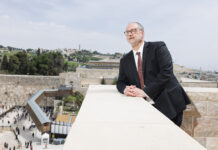Been following the recent South African election? I didn’t think so. But you likely know that the country has become a particularly Israel-phobic entity. At the end of last year, it brought allegations of genocide against Israel at the International Court of Justice. It has recalled all its diplomats from the country.
Just before the recent election, South African president Cyril Ramaphosa, who heads the nation’s long-ruling African National Congress (ANC), which once was headed by Nelson Mandela, spoke at an election rally in Johannesburg. His prepared speech, according to Politicsweb, a news website focused on South Africa, included a call for the release of the “hostages held in Gaza” by Hamas.
He chose to omit the line, though, instead leading the crowd in a chant of “From the River to the Sea, Palestine shall be free.”
And so it goes, in a country that Professor David Himbara called “a classic case of a de facto one-party state with mismanaged institutions and endemic crime and corruption.”
One might add: with a good amount of anti-White, anti-Asian and anti-Semitic tendencies, too.
In 2018, a provincial government official, Velaphi Khumalo, expressed his wish “to cleanse this country of all White people.”
“We must act,” he added, “as Hitler did to the Jews.” And he went on to declare that White people in South Africa “must be… skinned and your off springs [sic] used as garden [fertilizer].” (Mr. Khumalo was found guilty by a local court for hate speech and sentenced to… apologize.)
Last year alone, White South African farmers were subject to some 300 attacks by Black South African gangs. Fifty farmers were murdered.
And, just as Jews are regarded as nonWhite by White supremacists, we (and Israel) are derided as White oppressors by Black ones. The ANC, which garnered power on the pyre of apartheid and promised an end to racism, has proven instead to be a veritable engine of the same.
In the early post-apartheid years, South Africa maintained friendly relations with Israel. By 2015, though, ANC leader and then-president Jacob Zuma was courting a Hamas delegation.
After Mr. Ramaphosa’s recent speech, the South African Jewish Board of Deputies rightly expressed “revulsion” over his chanting of the Hamas slogan and accused the president of having effectively called for the “exterminat[ion of] Jews from their homeland.”
“The chanting of this slogan,” the group said, “by a head of state of a government that recurrently tries to express their commitment to a `Two-State Solution’ as their policy on Israel and Palestine is hypocritical to the full.” Hypocrisy is the least of his crimes.
The speech, though, shouldn’t have surprised anyone. It was under Mr. Ramaphosa that South Africa initiated the legal action against Israel as perpetrating “genocide” at the International Court of Justice.
All of which makes the relatively poor showing of the ANC in the recent election—Mr. Ramaphosa promised his supporters that his party would easily win a majority of the votes in the election; it barely made 40%—cause for optimism. Well, okay, guarded optimism; the roots of anti-White, anti-Israel and anti-Semitic sentiments in South Africa run deep and wide.
The famed-for-corruption ANC may yet be able to ally itself with smaller parties that won’t ask too much in return for a seat at the table (or, as Financial Times’ David Pilling put it, “a snout in the trough”). But the unprecedented rejection of the long-dominant party is nevertheless meaningful. And a sign of at least a modicum of progress.
The second largest South African opposition party is the Democratic Alliance, which is not hostile to Israel. The new MK party, led by Israel-critic ex-President Zuma, is in third place. Close behind is the Economic Freedom Fighters faction, a pro-Hamas Marxist bloc.
Then there is the Zulu-backed Inkatha Freedom Party, which has conspicuously avoided condemning Israel. And several other minor parties.
The horse-trading to forge a coalition South African government has likely begun when you read this. Worth watching is which smaller parties will be part of the coalition, and whether the ANC will be forced to relinquish the Foreign Ministry.
Whether the new South African government will prove less unhinged when it comes to Israel can’t be known yet.
I’m not a betting man but, if I were, I would avoid any wager here.
To read more, subscribe to Ami





















